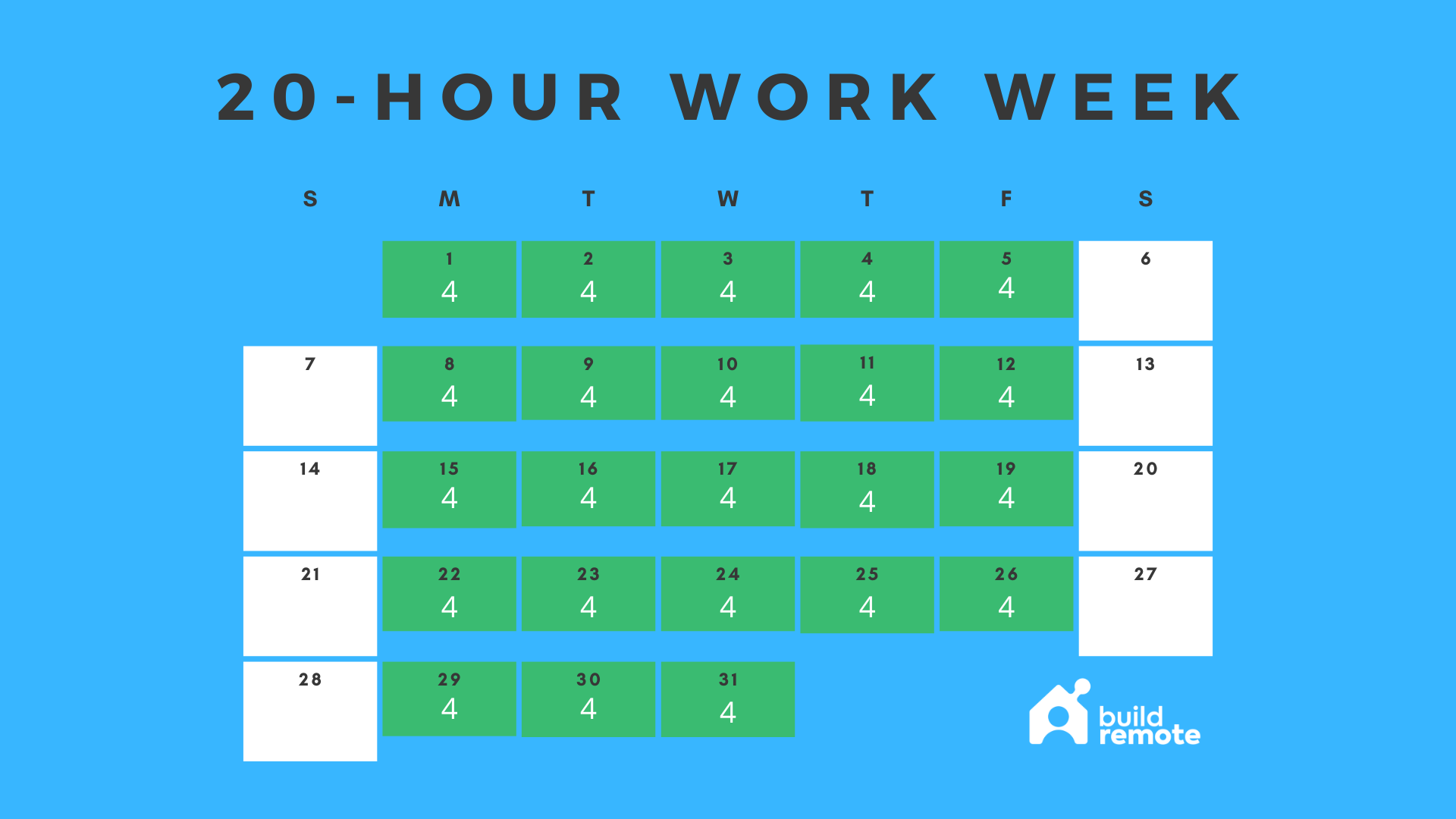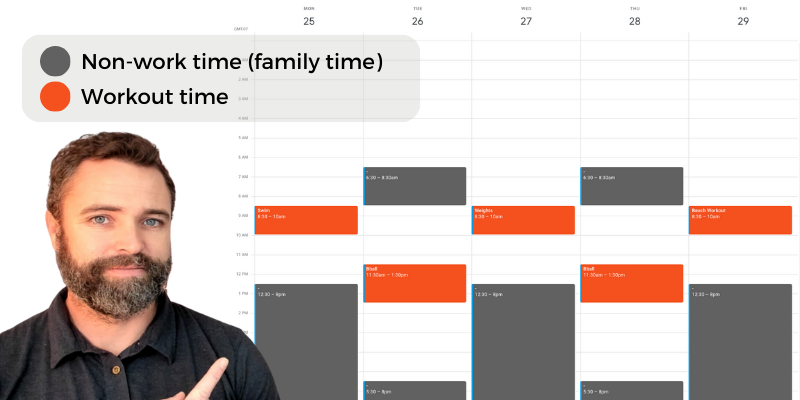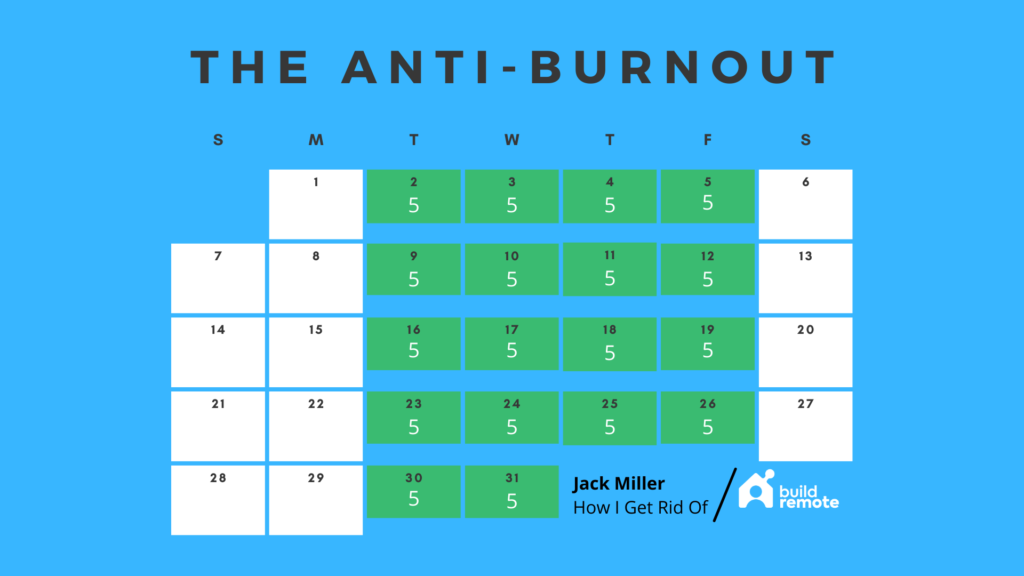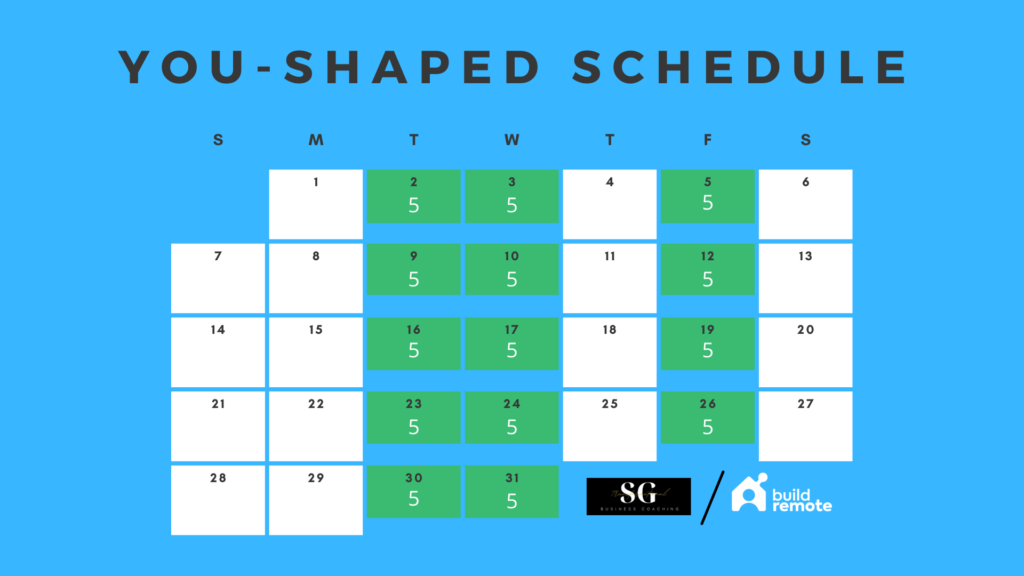20-Hour Work Week: 13 Real Schedules To Try

What is a 20-hour work week?
A 20-hour work week is often structured as five work days with four hours of work per day. An alternative format is to work 6-7 hours per day for three days per week. These are the types of people who work this schedule: 1) part-time employees, 2) freelancers or contractors, or 3) entrepreneurs who own their own businesses.
In 1930, economist John Maynard Keynes predicted his grandchildren would work 15 hours per week due to improvements in technology and, therefore, productivity. In other words, the robots would do the work and we’d reap the rewards. But for whatever reason, the economist’s great-great grandkids are in the workforce now and most full-time employees are still stuck at the 40-hour work week, which ironically was widely adopted starting in 1926 (just a few years before Keynes’s prediction).
There are people who work 20 hours per week these days, but they are either part-time employees, contract workers, or entrepreneurs who set their own schedules. I asked our list of contributors to share their weekly work schedules if they work about 20 hours per week. I received 23 replies, and we’re highlighting a range of unique formats here.
Creative Schedules If You Work 20 Hours Per Week
My 20-Hour Work Week ScheduleI work about 25 hours per week on average. You can see a picture of my weekly calendar above and you’ll notice that I use the calendar in reverse. I add blocks to indicate when I’m not working and then back into my work hours after that. The white/blank space is my opportunity to work. Typically, I’ll work about 25 hours per week but I can increase that by starting earlier, working at night, or grabbing a block of time on the weekends. Here’s the pattern of when I work: My wife and I trade off afternoons working and spending time with our kids during the week. That way, we each get to about 20-25 hours per week and have plenty of family time. Having bursts of work time in 1-3 hour blocks really helps me focus, too. |
Five by Four
20 hours per week over Monday, Tuesday, Wednesday, Thursday, Friday
I typically start work around 7:30 a.m. and work until lunch. This leaves my afternoons free.
When I retired, I struggled with finding a purpose. I started documenting our travels and found a new passion as a content creator. However, I did not want or need a full-time job, so I chose to work part-time. I am most productive in the morning and find if I work later in the day, I am extremely unfocused. Plus, I love the feeling of accomplishing a project before lunch. Therefore I normally work in the morning and spend the afternoon doing fun stuff like hiking, biking, and exploring amazing places.
– Kara Metcalf of Trying To Unwind
My work week is structured into the mornings. I work a typical Monday to Friday, but only from 8 a.m. to 12 p.m. This allows me to have afternoons and evenings free to develop personal projects, organize any events, or meet potential collaborators in a more personal setting while allowing me time to spend with my children. I wouldn’t say I’m doing much less work, as those four hours are completely focused on doing the most I can and really utilizing the time I have. Of course, sometimes you have to put in more hours, but I try to keep to this focused ideal as much as possible.
It was mostly decided through knowing that I work better in the morning, allowing for short sharp bursts instead of a longer, slower day, and it also allowed me freedom in the afternoons with my family.
– Alex Mastin of Home Grounds
Three-Day Week
22 hours per week over Tuesday, Wednesday, Thursday
I decided to work midweek days so I would have an extra-long weekend.
I decided to work this schedule because I have two children and don’t want to do full-time work anymore. Working mid-week gives me a good presence at work and allows me to have an extra-long weekend. I feel like I have more of a work-life balance now and am happier with my time management.
– Amber Rogers of My Chicken Guide
The Afternoon Shift
20 hours per week over Monday, Tuesday, Wednesday, Thursday, Friday
I work four hours a day, five days a week. Monday through Friday, 1 p.m-5 p.m.
I’ve never been a morning person, so now I take mornings off to enjoy a couple of cups of coffee and spend a few hours in the gym before starting my day. Building my working hours around the way my psyche works has made me far more productive, effective, and successful, and I’m kind of sorry that I didn’t start working “The Afternoon Shift” a lot earlier.
– Robert Greene of Price of Meat
Daily Time Blocking
20 hours per week over Monday, Tuesday, Wednesday, Thursday, Friday, Saturday
I structure my typical work week in a way that I need to balance work, doing household chores, taking care of my baby, and taking care of myself. I grind from Monday to Saturday, but I don’t allow myself to work on Sunday (even if I want to sometimes), just to give myself a day to breathe and relax.
Having flexible time and working 20 hours per week is life-changing. I get to learn better time management, develop strong discipline, and (most especially) make the most of my “holy hour,” a time when I could be the most productive. Cheesy as it may seem, my schedule helped me be a better version of myself (in terms of my career and my family life), so I’m really grateful for it.
– Arvie Narido of Gift Rabbit
Productive Fun
20 hours per week over Monday, Tuesday, Thursday, Friday
I have divided the 20-hour weekly work schedule into two parts where I actively work on business functioning for 10 hours and the remaining 10 hours on creating business, marketing, and brand ideas. To enhance my productivity, in a week I spend 15 hours in the office and five hours in an open environment like a cafe, co-working space, etc. Post-pandemic, I have set time apart for workouts, meditation, my family, and hobbies.
The new schedule enables me to achieve greater productivity while investing fewer work hours.
– Karthik Manoharan of WeCodee Innovations Pvt. Ltd.
The Anti-Burnout, 4-Day Week
20 hours per week over Monday, Tuesday, Wednesday, Thursday
I usually work around 20 hours per week. I usually take Fridays off, allowing me plenty of time to spend with my family, do chores, and relax. Additionally, it helps me stay productive for the other four days because I know I have Friday off to look forward to.
I always knew I wanted to have a family and spend time with them. However, I also knew that I wanted a successful career. When I was younger, I thought this meant working long hours and sacrificing time with my family. As I got older, I realized that there are other ways to be successful. I decided to work a four-day work week to have more time for my family. This schedule has allowed me to be more productive and efficient with my time. Additionally, it has given me more energy to devote to my family and hobbies. I am very happy with this schedule and recommend it to others.
– Kate Zhang of Kate Backdrop
20 hours per week over Tuesday, Wednesday, Thursday, Friday
When I put up the business, I promised myself to work at a comfortable pace to avoid burnout at all costs. After some trial and error, this is the schedule that worked best for me.
– Jack Miller of How I Get Rid Of
Fluidity and Flexibility
20 hours per week over Monday, Tuesday, Wednesday, Thursday, Friday
I have five kids, so my structure is very fluid. Most of the time, I end up staying up until 2:00 a.m. working because I haven’t had a chance to get things done earlier in the day. Thankfully I have the flexibility to do that.
My number one priority was being home with my children. Being a stay-at-home mom has been my lifelong dream. But after a few years of only doing that, I wanted something to stretch my mind. Working from home lets me earn an income, exercise my brain, and still raise my kids full-time.
– Melanie Musson of Clearsurance.com
Half-Day Bliss
25 hours per week over Monday, Tuesday, Wednesday, Thursday, Friday
Weekdays: 7 a.m. – 12 p.m.
My peak productivity is in the early morning hours. I like to start the work slowly by answering emails, and as the world and corporate offices are waking up, I am moving forward to the day’s most important tasks. Usually, I am done with work by noon and have the rest of the day to myself.
– Jason Baker of Emerald House Cleaning
Three by Seven
21 hours per week over Monday, Wednesday, Friday
I work seven hours on Monday, Wednesday, and Friday, and I spend Tuesday and Thursday with my daughter while my wife works. Most working days are a mix of responding to client inquiries, project management, and some translation, plus associated admin.
I chose this schedule to fit with my wife’s working pattern so we can manage childcare ourselves. Working one day on, one off is really refreshing, and I can highly recommend it, as I find you get less mentally tired and can achieve more after a day doing something else as opposed to the fatigue of five consecutive working days.
– Mark Hemming of Libra Translation
Two-Hour Increments
18 hours per week over Monday, Tuesday, Wednesday, Thursday, Sunday
I typically work in one- to two-hour increments, never exceeding more than four hours most days. I have a target of 15-20 hours a week, so if I work a full four hours one day, I will not work at all the next, so I can spread my work throughout the week.
I am a working college student, so the hours I work are contingent on classes and other activities I have on my schedule. I find that I can easily be distracted, especially in a remote setting. By only working in small increments, I can focus on my work before pivoting to something else. This helps me keep a focused balance between each aspect of my life, especially when I eat, where I sleep, where I work, and where I play.
– Ashlyn Cook of UniMovers
Five by Three
15 hours per week over Monday, Tuesday, Wednesday, Thursday, Friday
I work three hours per day — according to research, the average worker is only productive for three hours per day! (Source: Inc.com). Instead of spinning my wheels trying to squeeze as much productivity out of the day as possible, I maximize my best three hours for high-quality work. Creativity requires margin, so I rejuvenate my brain by playing with my kids or doing simple tasks like folding laundry. Working from home with this structure allows me to balance taking care of everything important to me, like running my business, taking care of my family, and cultivating my home.
Running my own copywriting business gives me the power to make an impact with my words AND have a schedule flexible enough to meet the demands of caring for my young kids. It allows me to do it all — without feeling like I’m constantly on the verge of burnout!
– Megan Kachigan of Kachigan, Inc Copywriting
You-shaped Schedule
15 hours per week over Tuesday, Wednesday, Friday
For years, I worked as much as I could trying to squeeze as much out of myself as I possibly could. However, my health started to go down hill, not to mention my mental health! After becoming a mother, I was determent to break this harmful pattern and show my kids I could be successful without burning myself out, or ruining my relationships in the process. That is why I prefer the “you-shaped” or “me-shaped” work schedule. It fits my family as well as my personal needs.
Because my schedule is designed to prioritize my (mental) health, I feel great 99 percent of the time. This means that when I work, I can focus, be productive and get things done quickly. I rarely waste anytime staring at my screen because I don’t know what to do, or where to start. The “you-shaped” schedule allows me to show up fully and deliver create results for my clients.
– Susanne Grant of Grant Method Coaching
Where else does the 15-hour work week come from?
In 1930, Economist John Maynard Keynes predicted his grandchildren would work 15-hour weeks due to advances in technology and productivity.
Who typically works 20 hours per week?
The 20-hour work week typically falls into three categories of workers: 1) part-time employees, 2) freelancers or contractors, or 3) entrepreneurs who own their own businesses. There are not any well-known companies that have their full-time employees on a 20-hour schedule, so this work week is typically for more unique situations.
Are there 20-hour work week jobs?
You won’t find any full-time, 20-hour jobs. If you’d like to work 20 hours per week, you need to set your search filters to part-time and/or contract work.
If you’d like to see what’s out there for flex-schedule positions and companies, take a look at Flexjobs. You’ll find dedicated filters to “flexible” and “alternative” schedules.
View other unique work week schedulesThis is part of our series highlighting unique work schedules. Have a look: |
We hope you find this article useful. Just so you know, Buildremote may collect a small share of sales from the links on this page to help keep this site running.




